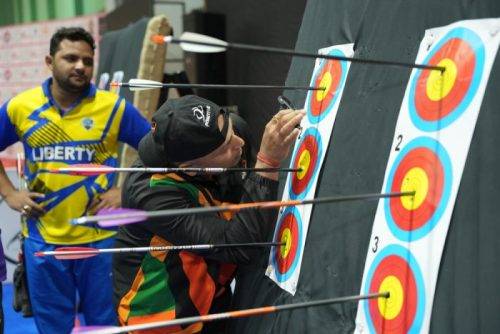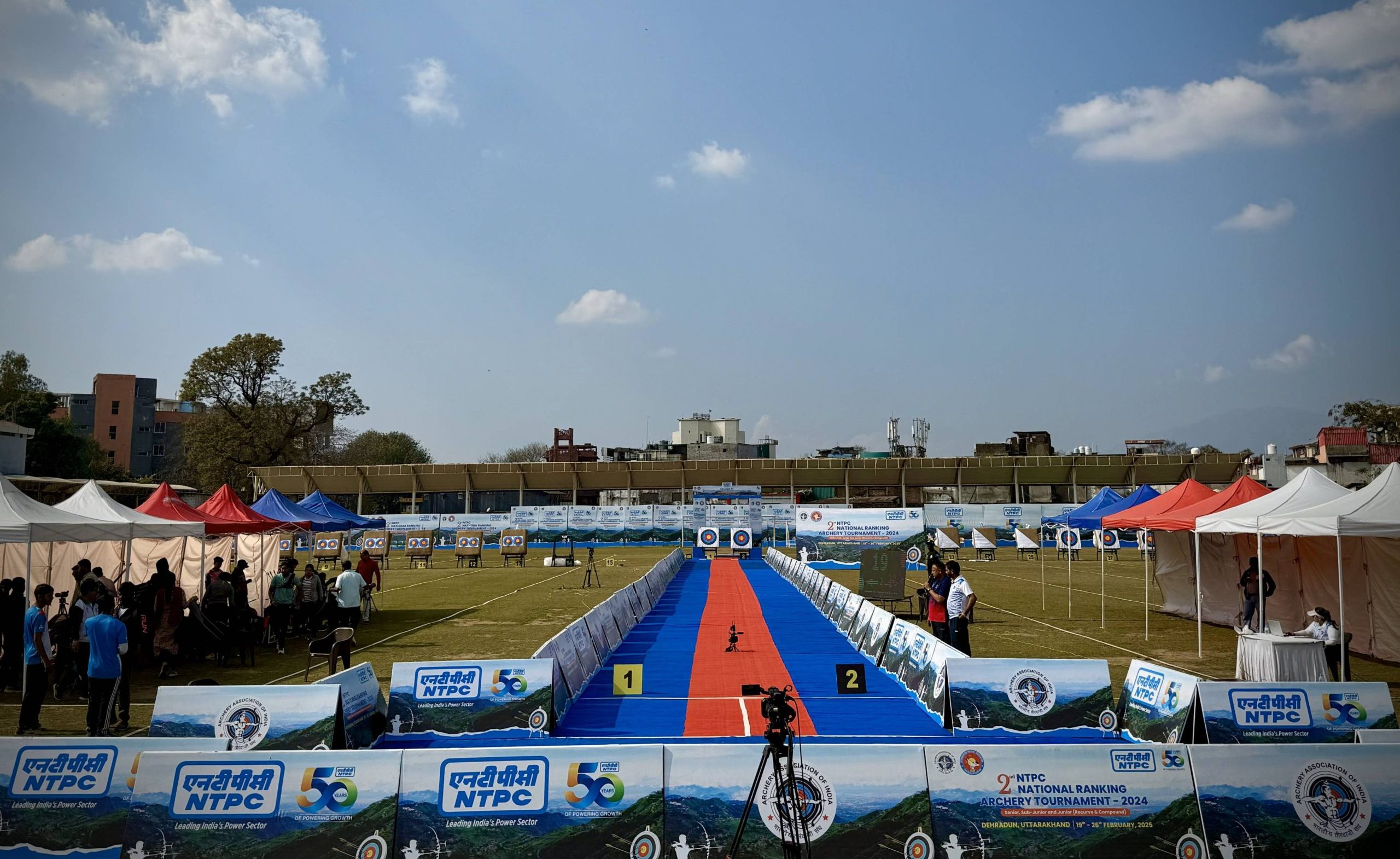MENTAL STRENGTH in Archery: We might not all have the physical gifts of Deepika Kumari or Abhishek Verma but we can learn to think as they do to maximise the physical abilities we do possess and to conquer our goals.
The mental demands of rigorous competition can be enormous, making sports psychology a crucial part of any athlete’s training regimen.
“Wisdom is always an overmatch for strength.”
Sports Achievers and Olympic champions, backed by decades of factual research, all agree that the proper use of sports psychology strategies can significantly improve any athlete’s performance.
As one progresses to the higher levels of any sport, physical skills tend to balance out among competitors.
Important mental skills for athletic excellence include:
- Supreme, unwavering confidence in your abilities
- The ability to keep a laser-like focus when surrounded by distractions
- The capacity to sustain a high level of motivation throughout a long season
- The strength of will to conquer all anxiety, frustration, and discouragement
- The power to bring your intensity to the next level when needed
Effective mental training tools include:
- Clear and challenging short- and long-term goals
- Visualization of making great plays and succeeding on the field
- Positive, energetic language used to motivate yourself into a winning frame of mind
- A consistent breath during all moments of action
- Confident, upbeat body language to get the feeling of success in your body and mind
Sports psychology services can be applied in all scenarios. Specific examples include:
- When the athlete wants to reach his or her full potential. By fine-tuning their game mentally and emotionally, he or she can eventually exceed even his or her greatest expectations.
- When the athlete experiences any kind of setback, such as a mental block, performance plateau, prolonged slump, demotion, or injury.
- When off-field issues or concerns begin to interfere with the athlete’s performance.
Mental Strength in Archery: Your mentality will either hold you down or bring you up. Strive to master your mind rather than being mastered by it. If you don’t, you risk losing every game before it even starts. Think about how you can improve your performance in the following areas:
- How you prepare mentally in practice and during training
- How you maintain a winning mindset on the day of competition
- How you manage your thoughts in the moment of action
- How you deal with distractions
- How you use the results of competition to build your character from event to event
- How you communicate with others as a leader and a teammate
- How you decompress after training and competition to stay fresh and avoid burnout
When dealing with results, take the time to learn from every poor performance rather than brooding or trying to forget it. After a peak performance, write down specifically what you were thinking, feeling, and doing immediately before, during, and after the event. The next time you need a boost in confidence or motivation, refer back to the list.
Mental Strength in Archery
So what choice are you going to make for yourself?
Review and decide!!!
Question #1: When are you most confident and least confident in your sport?
Tip #1: Draw a line down the middle of a sheet of paper. At the top of the left column, write, “Situations in my sport in which I am most confident,” and on the right side, “situations in my sport in which I am least confident.” Write at least three situations in each column to help you visualize.
Question #2: Have you incorporated mental imagery into your pre-race or pre-game routine?
Tip #2: Establish a specific time and place to do your mental imagery. Think about successful performances and use all of your senses. Try to think about what it looks and sounds like when you’re in the right place to be successful.
Question #3: Do you perform any exercises or do you use positive self-talk to boost your self-confidence?
Tip #3: Talk to other athletes on your team whom you admire to see if they use positive self-talk. Write three positive self-statements on index cards and review them each morning and before you go to sleep at night.
Question #4: Do you study your opponent’s weaknesses and strategize pre-game on how you can leverage your strengths over your opponent?
Tip #4: Begin to pay closer attention to your own tactical strengths and weaknesses. Write down three examples of each. For each game or match, write down the major weakness of your opponent to keep it fresh in your mind.
Question # 5: Is there a coach or someone on your support team who can actively instill confidence through the power of words or remind you of past successful performances?
Tip #5: Pay close attention to your coach’s words of praise. Write them down and repeat them to yourself. Commit them to memory, so that when you are in a pressure situation, they will automatically come to mind.
MENTAL TOUGHNESS (Mental Strength in Archery)
Mental toughness is the ability to consistently perform at your best in any situation. No matter what your skill level or talent, any athlete can learn to be mentally tough. Any athlete can use mental toughness to maximize their potential and get an advantage over their competitors.
The mentally tough athletes are the ones who get the ball when big plays need to be made, the one the team looks to lead them in tough situations, the ones who play consistently at their best in any situation no matter what is happening around them. If you want to be THAT person start working on your mental toughness now. Here are 5 exercises you can do to get started:
- Improve Self-Awareness:Be aware of your weaknesses so you can work on them. Know your strengths so you can use them.
It is important to identify situations that you find difficult to deal with when competing. For example it could be certain mistakes or multiple mistakes, a frustrating opponent, bad calls or trying to close out a match. Once you have done this the next step is to make plans to commit to when these happen in the future. These should include thoughts, strategies for body reactions, behaviors, and a game plan for your play.
The last step is to practice your new plan, first in training and then in competition. At first it may be a challenge to change your natural way of thinking and behaving for situations but like any new skill with practice it will become automatic.
- Become Resilient: Develop a refocusing routine that you can use to bounce back quickly from mistakes and focus on the present. The goal is to achieve the same winning mindset before every point, play or skill. You will perform consistently in competition like you do in practice.
Mental Strength in Archery: If you use your routine successfully you will become resilient and be more likely to perform your best in any situation. A refocusing routine includes both physical and mental steps that you follow each time you need to refocus. To develop your own follow the steps below:
- REACT:An emotional release that allows you to accept and release your feelings in a controlled way.
- RELAX:Come back to the present moment by using deep breathing and muscle relaxation.
- RENEW:Use a strategy to get back to your winning mindset such as a positive affirmation or visualization.
- REFOCUS:The key here is to get out of your head and focus on something in the external environment. You do not want be analyzing or over-thinking. For example use cue words or focus points.
- Increase Confidence:To be able to keep believing that you can perform well you need your mind full of past successesand reasons why you can play your best in any situation. This can come from remembering past performances where you dealt with tough situations and were able to perform at your best.
To start with try this exercise: Write down 3 past performances where you overcame a difficult situation and were still able to perform to your best. Include how you were able to do this. It is also helpful to have images in your head of what you achieved. It is great to have a list of these situations that you can focus on when you begin to doubt yourself. You can use this list to need to increase your confidence when performing, particularly if you are not playing well or when you need to show your best under pressure.
- Tough Thinking:To be mentally tough you need to have a strong mind.Having a strong mind means mastering your self-talk and choosing what thoughts you use. If you can control your mind you will stay in the zone and keep your winning mindset. You need to be able to recognize when you are using negative or unhelpful thinking and use techniques to stop or change your thoughts. You also need to be able to replace thoughts with positive or helpful thinking.
It is important to understand the types of thoughts that can hurt and help you to manage your emotions and your performance. Once you understand this you can develop a list of positive and helpful thoughts you can use in tough situations to improve your mental toughness. Mental Strength in Archery.
One exercise to get you started is: Thought Stopping. First you need to recognize when you have a negative or unhelpful thought. For the next step there are 3 options:
- Immediately imagine a big red stop sign or red flashing light
- Immediately say “STOP” to yourself
- Immediately do both together
This will interrupt the negative thought. Next refocus on what you need to do in the present to perform successfully. Practice using this technique as much as possible in training first. Like any skill it can take time to develop but once it does you will have a very strong mind.
- Perform under Pressure:To be mentally tough athletes you need to be able to perform under pressure and show your best when you really need it.To stay composed and produce in the big moments develop focus points on how to play well.
Think about when you are playing your best, what specific skills do you do well? These can be technical, physical or mental and will probably be part of your game plan. They need to be specific and in your control. For example “calm and composed,” “move your feet,” “good form” or “watch the ball”. Use these when you recognize that you are distracted by the pressure to get you refocused on how to play well.
“The best motivation always comes from within.”
– Michael Johnson (Gold Medal Sprinter)Contributed by:
Ashish Tomar
Secretary- General
Uttarakhand Teerandazi Association




